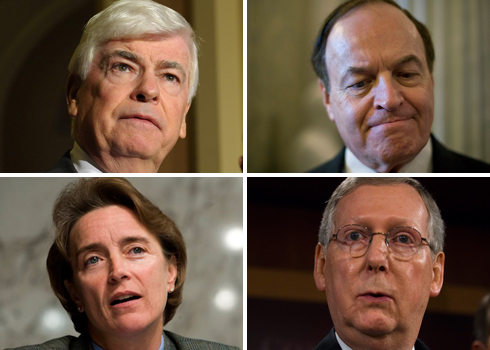Senate Democrats, guided by the White House, wasted little time responding to Republican opposition to their financial regulatory reform proposal. A day after GOP came out swinging against a bill authored by Senate Banking Committee Chairman Chris Dodd, Democrats had a simple message for the minority: your time is running out. This touches off a game of chicken over the first big issue Congress will address after health care reform. And the question of whether the two parties can reach agreement over a growing number of disagreements remains in serious doubt.
This morning, Dodd took the the Senate floor to sound the warning to the GOP. “My patience is running out,” he bellowed after issuing a withering critique of Republican leaders for grounding their opposition to his reform bill in a political strategy memo authored by conservative strategist Frank Luntz. Dodd has been negotiating with his counterpart, Sen. Richard Shelby (R-AL), but those talks may not last much longer.
If they’re to be successful, somebody’s going to have to give. The Obama administration is driving a very hard line on financial reform. They have made it clear to leading Democrats in Congress time and again that they will not tolerate making major concessions to the GOP, particularly if those concessions aren’t guaranteed to win any votes. Most recently, according to Republican and Democratic sources, the Obama administration put the kibosh on negotiations between Senate Agriculture Committee Chair Blanche Lincoln and her counterpart Saxby Chambliss, who were negotiating a compromise on derivative regulation that the White House and Dodd found unacceptable. With Lincoln facing a stiff primary challenge, the administration made it very clear they wouldn’t abide by her expected proposal.
“As the bill moves to the floor, we will fight any attempt to weaken it,” warned Treasury Secretary Timothy Geithner, in a Washington Post op-ed yesterday. “The American people have suffered through too much to enact reform that does too little.”
And sure enough, yesterday, Lincoln–typically one of the most conservative Democrats in the Senate–announced that she was putting forth derivatives regulation language that exceeded the White House’s expectations.
But that also served to widen the divide between Republicans, who oppose requiring all derivatives to be traded and cleared on an open exchange, and Democrats, who will likely need 60 votes to break a filibuster if they want their bill to actually pass.
It’s not just derivatives either. Republicans hold that Dodd’s bill does nothing to address the problem of institutions that are too big to fail, and will perpetuate future bailouts. Among other things, they oppose the creation of a $50 billion fund, raised by imposing a fee on large financial institutions, that would cover the cost of winding down failed firms. Better, they say, to avoid the perception that any funds can be used to wind down institutions, and to let them fail.
“In ordinary bankruptcy, you can get debtor-in-possession money,” Shelby told reporters yesterday.
“Companies have assets and through a bankruptcy court or a resolution court they can do this.”
As for institutions that are already too big to fail, Republicans are mostly mum, though Shelby hinted that he (though not necessarily other Republicans) would support breaking them up pre-emptively.
The White House has left congressional Democrats little wiggle room on these issues. Republicans say they want to turn this into a political issue. There’s no doubt some truth to that, but the White House also wants a bill, and they’re banking on the idea that Republicans won’t unilaterally kill a bill that restricts the excesses of Wall Street: perhaps the only institution in America more hated than Congress.
Video of Dodd’s speech below:










